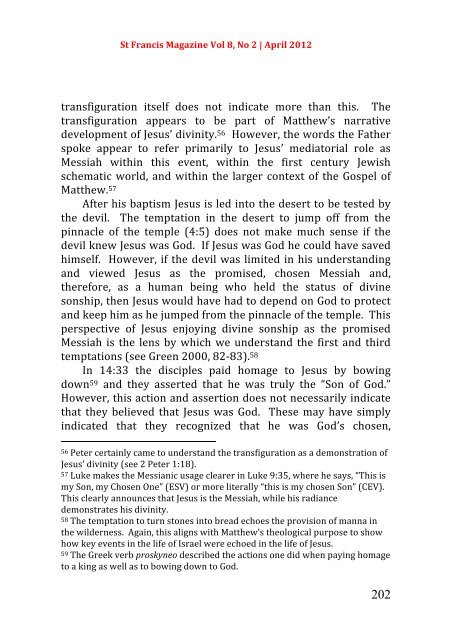Untitled - St.Francis Magazine
Untitled - St.Francis Magazine
Untitled - St.Francis Magazine
Create successful ePaper yourself
Turn your PDF publications into a flip-book with our unique Google optimized e-Paper software.
<strong>St</strong> <strong>Francis</strong> <strong>Magazine</strong> Vol 8, No 2 | April 2012 transfiguration itself does not indicate more than this. The transfiguration appears to be part of Matthew’s narrative development of Jesus’ divinity. 56 However, the words the Father spoke appear to refer primarily to Jesus’ mediatorial role as Messiah within this event, within the first century Jewish schematic world, and within the larger context of the Gospel of Matthew. 57 After his baptism Jesus is led into the desert to be tested by the devil. The temptation in the desert to jump off from the pinnacle of the temple (4:5) does not make much sense if the devil knew Jesus was God. If Jesus was God he could have saved himself. However, if the devil was limited in his understanding and viewed Jesus as the promised, chosen Messiah and, therefore, as a human being who held the status of divine sonship, then Jesus would have had to depend on God to protect and keep him as he jumped from the pinnacle of the temple. This perspective of Jesus enjoying divine sonship as the promised Messiah is the lens by which we understand the first and third temptations (see Green 2000, 82-‐83). 58 In 14:33 the disciples paid homage to Jesus by bowing down 59 and they asserted that he was truly the “Son of God.” However, this action and assertion does not necessarily indicate that they believed that Jesus was God. These may have simply indicated that they recognized that he was God’s chosen, 56 Peter certainly came to understand the transfiguration as a demonstration of Jesus’ divinity (see 2 Peter 1:18). 57 Luke makes the Messianic usage clearer in Luke 9:35, where he says, “This is my Son, my Chosen One” (ESV) or more literally “this is my chosen Son” (CEV). This clearly announces that Jesus is the Messiah, while his radiance demonstrates his divinity. 58 The temptation to turn stones into bread echoes the provision of manna in the wilderness. Again, this aligns with Matthew’s theological purpose to show how key events in the life of Israel were echoed in the life of Jesus. 59 The Greek verb proskyneo described the actions one did when paying homage to a king as well as to bowing down to God. 202







![Reflections on Surah Fatiha and the Lord's Prayer[1] - St.Francis ...](https://img.yumpu.com/49377951/1/184x260/reflections-on-surah-fatiha-and-the-lords-prayer1-stfrancis-.jpg?quality=85)








